Blood-Drenched Beard
by Daniel Galera, trans. by Alison Entrekin
Daniel Galera's U.S. debut features a nameless, Brazilian physical education teacher who suffers from prosopagnosia, a rare disorder also known as face blindness. He cannot recognize or remember faces, even his own. He must identify people by other means and sees the world in a slightly different way than most. "He ignores faces and learns to recognize people by their attitudes, problems, stories, clothes, gestures, voices, the way they swim, the progress they make in the water. Their characteristics congeal to form a diagram that he can evoke and study in his free time." Those close to him understand his disability, but when he interacts with others who are unaware, it can create awkward, even potentially volatile, situations.
Galera's protagonist finds himself in a precarious position at the book's onset when his father informs him he's had enough of life and is going to commit suicide. The son's first reaction is to get up and leave, because he simply doesn't know how to respond: "What do you want me to do after hearing that kind of s**t? Either you're serious and want me to convince you to change your mind, which would be the most f**ked-up thing you've ever asked me to do, or you're having a laugh at my expense, which would be so pathetic that I don't even want to find out. 'Bye."
What his father actually wants from him is to take his beloved dog, Beta, and have her euthanized once he has died. He can't bear to do it himself and believes she'll die from depression otherwise. But when the father follows through on his promise, the son is unable to part with the last connection he has.
After his father's suicide, the protagonist decides he needs a change of scenery, so he and Beta move to a small apartment on the water in the seaside town of Garopaba. He takes a job giving swimming lessons and begins to make friends in his new home. He also recalls a story his father told him about his grandfather, Gaudério, who lived in Garopaba:
"I got a call from a police chief in Laguna saying [Gaudério'd] been murdered. There had been a Sunday dance at some community hall, the kind where the whole town goes. When the dance was in full swing, the lights go off. When they come back on a minute later, there's a gaucho lying in the middle of the hall in a pool of blood, with dozens and dozens of stab wounds. Everyone killed him; that is, no one person killed him. The town killed him.... Except that I don't believe that story.... Because there was no body."
The intrigue of his father's story goads the protagonist into asking questions about his grandfather, but his subtle investigation doesn't sit well with the locals who react suspiciously at the mere mention of Gaudério's name. The narrator's prosopagnosia only adds to their distrust of him--friendships are minimal and distant and he keeps his struggle hidden from most people, so they don't have the opportunity to understand. It isn't long before they're treating him like an outcast. The townspeople's growing hostility doesn't deter him, although his digging may result in him hollowing out his own grave.
Galera, a swimmer himself, makes strong use of his protagonist's affinity for water, depicting the unpredictability and danger but also illustrating the beauty, and the cleansing and healing nature, of the sea. Both the protagonist and Beta experience hydro healing: he emotionally from the pain of his loss; she physically after being hit by a car and nearly dying. They cement their emotional bond through their time together swimming.
Galera also uses water to develop atmosphere in the novel, whether a light, carefree quality:
"On days like this the ocean resuscitates in him a childhood vision that miniaturizes everything. Tiny waves seen with his eyes at surface level are mythological tidal waves breaking over his head. The sinuous sand at the bottom is a scale model of a great desert where a crab's chitinous shell looks like the bones of some giant creature extinct many eras ago. "
Or a dark, foreboding mood:
"A flash of lightening illuminates the cliff, his foot stepping into the void and a stormy sea that is chaos itself extending out on all sides.... On his way down, the vision of the vortex of waves and foam that will swallow him is emblazoned in his mind with hyperreal clarity, the ocean that he so adores showing its most private and destructive facet, revealed to few men."
The combination of weather and the ocean offers Galera many options with which to set the story's tone, and the strong atmosphere in turn works to enhance suspense as the protagonist searches for answers about his family--ultimately, the search for his own personal identity.
Atmospheric, multi-layered and poetic, Galera certainly makes a splash with Blood-Drenched Beard, and the ripples will surely affect all they touch. --Jen Forbus



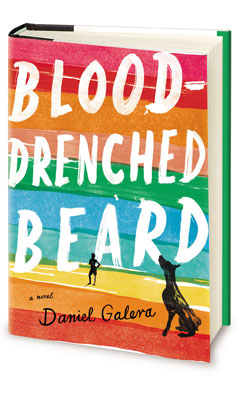
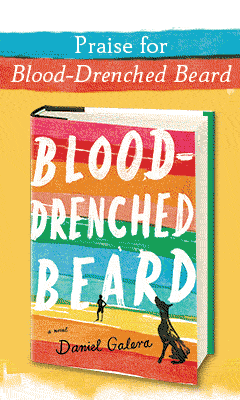
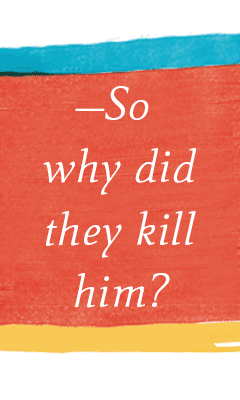
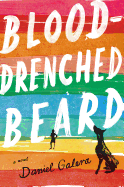
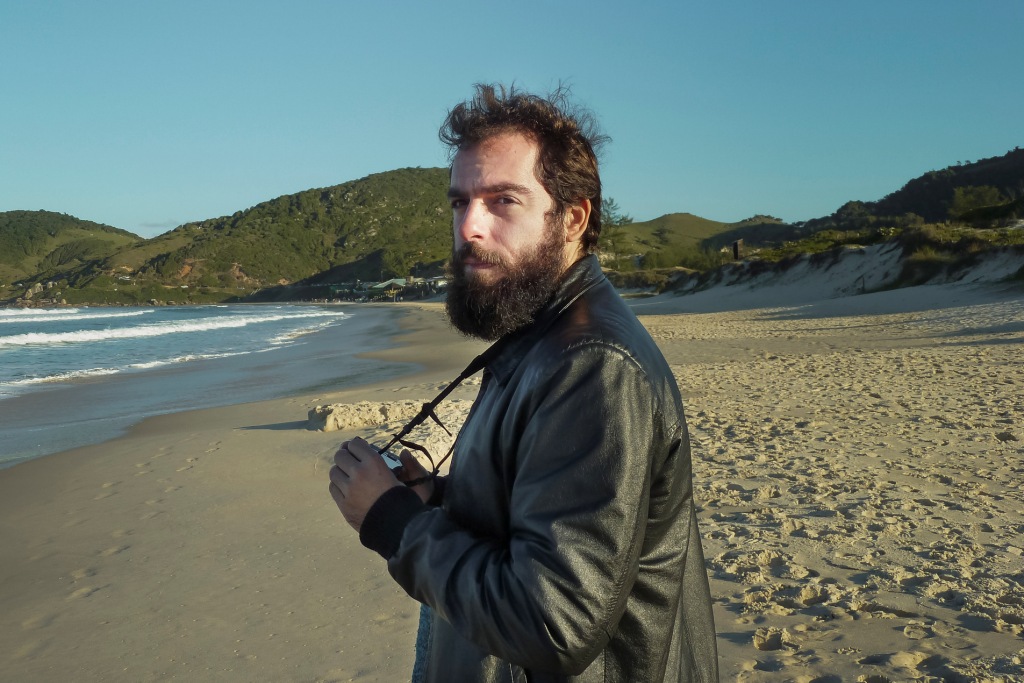
 The seed for Blood-Drenched Beard came from a story your father told you about a murder in Garopaba. But you made sure not to ask anyone in the town about the murder. So did anything from that original story he told you seep into the plot, or was it all created in your imagination?
The seed for Blood-Drenched Beard came from a story your father told you about a murder in Garopaba. But you made sure not to ask anyone in the town about the murder. So did anything from that original story he told you seep into the plot, or was it all created in your imagination?